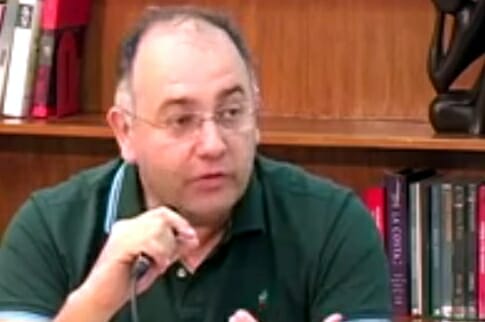
Jun 3, 2015 | Focolare Worldwide
 “The Economy of Communion (EoC) has returned to Africa. We’re here from around world, drawn by both the blessings and the wounds of this great continent, to take a look at the world economy from an African perspective; also to be taught by these peoples, by their great calling to life, social relationships and encounter. I have always been struck by Africa’s ability to create, and by its life. There is a lot of dancing in Africa, a lot of feasting and celebration. One thing that I find stupendous in Africa is that you even see elderly women dancing. Nowadays, in Europe and in the Northern hemisphere it is less common to see elderly men and women freely celebrating and dancing over the joy of being together. We also came to Africa to learn how to dance, men, women and children. Africa certainly has a vocation to generate life in all of its dimensions. The sense of brotherhood with the earth and with all of nature is a great value of African culture. This is one of the many gifts that Africa offers to the entire Economy of Communion worldwide, and many future generations should make this discovery. What messages can reach the Africa of today from the EoC? We will take the time to tell our stories, both great and small, and from there we will set out into a new land. The first contribution that the EoC would like to take to Africa is appreciation and esteem for what Africa already is and not only for what it might become. The people’s first strength is their dreams, especially their collective dreams and those of the poor. Generating is very connected to an economic term that is important for Africa and for everyone: innovation. A first message that we receive from the logic of this new budding is subsidiatiry: our hands and our technology can only subsidize, that is, help the bud to bloom; they cannot invent it. The economic and social innovations of Africa will grow primarily from its own soil, from its land and not from the outside. The gift of the EoC is that of having eyes that can see buds where others see only deserts. There are many young people here in Africa who have already begun the walk, often together: and it is from these buds that we should learn to see the forest. The essential energy of any undertaking is the hunger for life, and for the future of young people and the poor, who are very abundant here in Africa. In order for the poor and excluded to become an engine of change of a country, the role of political and economic institutions is essential. New financial institutions are being born from the EoC. But banks and all the other institutions are only able to assist economic innovations, not create or invent them. Without people with creativity, talent, competence and passion, you will never give rise to the experience of a new economy. It is necessary that each individual activates his or her own innovative skills and, if possible, join it to that of others who have the same wish to do and create. Our dream is to create one of these institutions right here at Mariapolis Piero. It will be a centre that can be a place for trust, for accompanying and serving new EoC ideas that will be born especially from young people.”
“The Economy of Communion (EoC) has returned to Africa. We’re here from around world, drawn by both the blessings and the wounds of this great continent, to take a look at the world economy from an African perspective; also to be taught by these peoples, by their great calling to life, social relationships and encounter. I have always been struck by Africa’s ability to create, and by its life. There is a lot of dancing in Africa, a lot of feasting and celebration. One thing that I find stupendous in Africa is that you even see elderly women dancing. Nowadays, in Europe and in the Northern hemisphere it is less common to see elderly men and women freely celebrating and dancing over the joy of being together. We also came to Africa to learn how to dance, men, women and children. Africa certainly has a vocation to generate life in all of its dimensions. The sense of brotherhood with the earth and with all of nature is a great value of African culture. This is one of the many gifts that Africa offers to the entire Economy of Communion worldwide, and many future generations should make this discovery. What messages can reach the Africa of today from the EoC? We will take the time to tell our stories, both great and small, and from there we will set out into a new land. The first contribution that the EoC would like to take to Africa is appreciation and esteem for what Africa already is and not only for what it might become. The people’s first strength is their dreams, especially their collective dreams and those of the poor. Generating is very connected to an economic term that is important for Africa and for everyone: innovation. A first message that we receive from the logic of this new budding is subsidiatiry: our hands and our technology can only subsidize, that is, help the bud to bloom; they cannot invent it. The economic and social innovations of Africa will grow primarily from its own soil, from its land and not from the outside. The gift of the EoC is that of having eyes that can see buds where others see only deserts. There are many young people here in Africa who have already begun the walk, often together: and it is from these buds that we should learn to see the forest. The essential energy of any undertaking is the hunger for life, and for the future of young people and the poor, who are very abundant here in Africa. In order for the poor and excluded to become an engine of change of a country, the role of political and economic institutions is essential. New financial institutions are being born from the EoC. But banks and all the other institutions are only able to assist economic innovations, not create or invent them. Without people with creativity, talent, competence and passion, you will never give rise to the experience of a new economy. It is necessary that each individual activates his or her own innovative skills and, if possible, join it to that of others who have the same wish to do and create. Our dream is to create one of these institutions right here at Mariapolis Piero. It will be a centre that can be a place for trust, for accompanying and serving new EoC ideas that will be born especially from young people.”
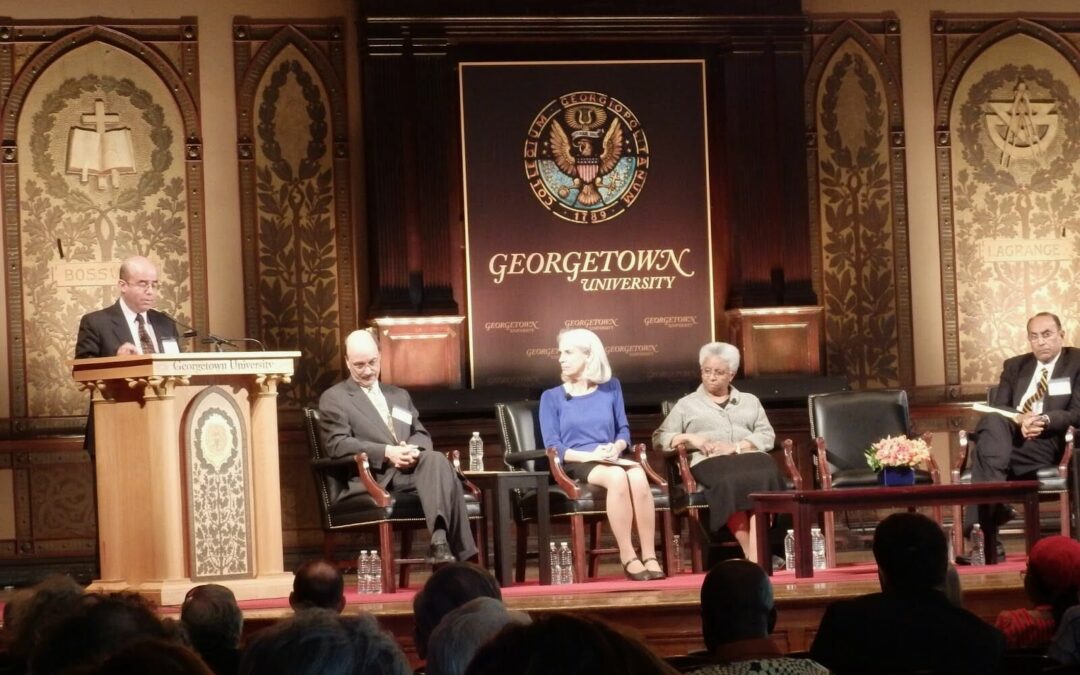
Jun 1, 2015 | Focolare Worldwide
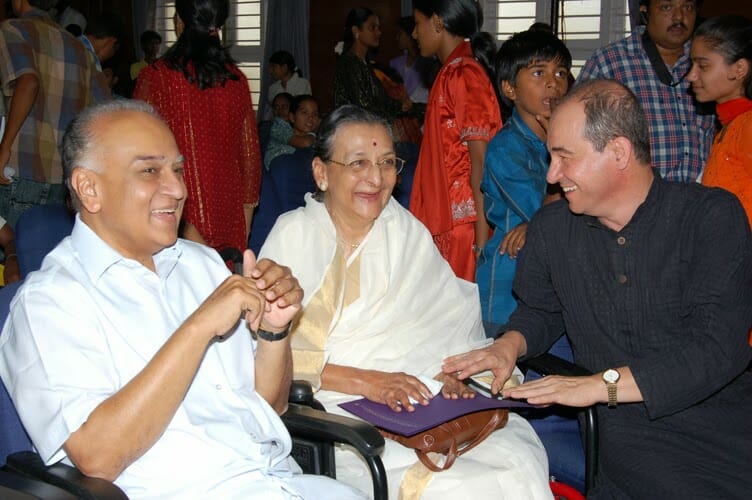
Roberto Catalano (right right) with Minoti Aram, of the Shanti Ashram in Combiatore (India), and other Hindu participants at an interreligious workshop.
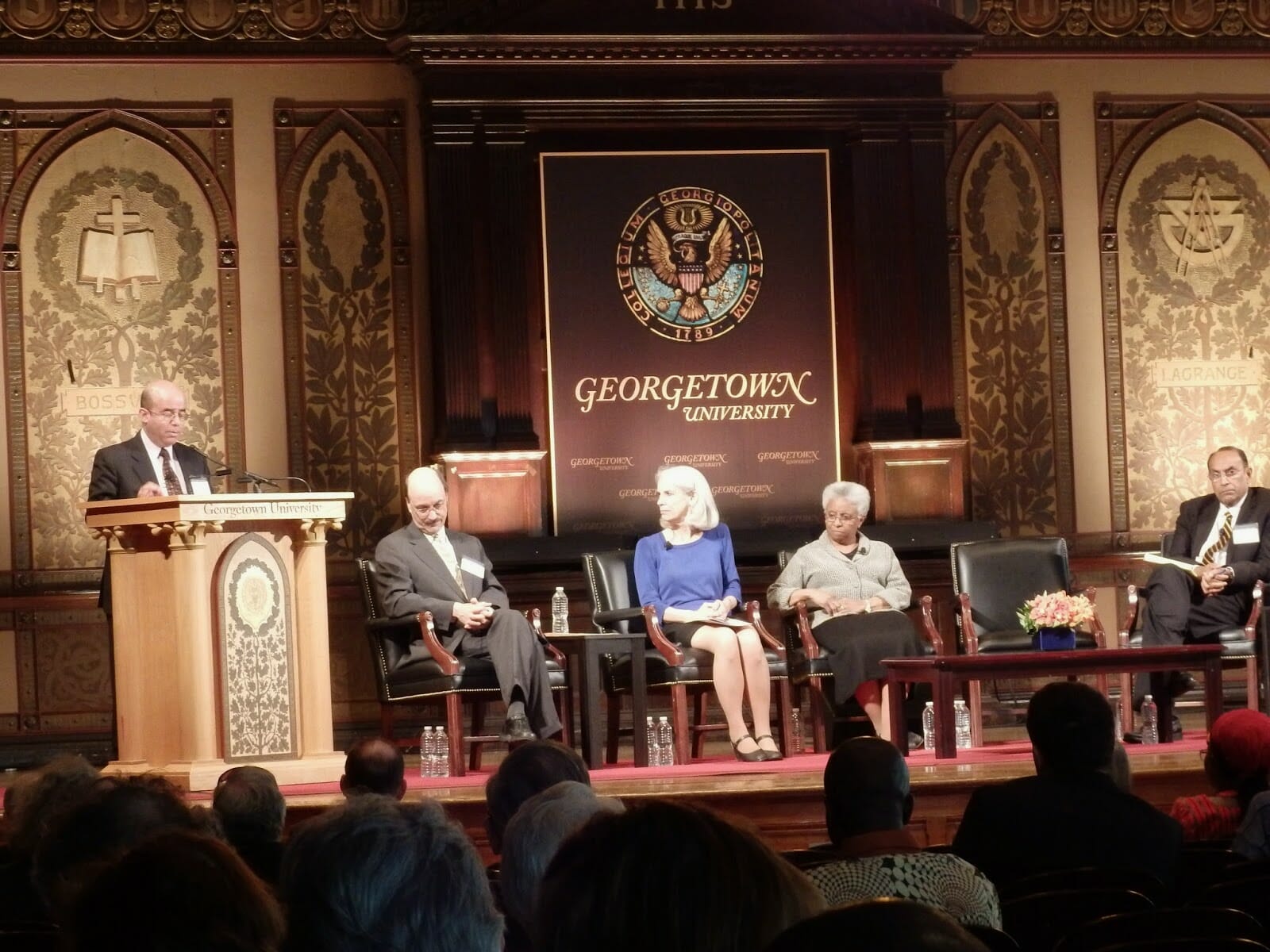 “The conference is of great value,” continues Roberto Catalano. “There were speeches in the plenary session and also in parallel sessions of great theological and spiritual depth. Great human and intellectual openness, and a desire to deepen our understanding of an event like the Council from different points of view: geographical without a doubt, but especially of perspective and of content. There were speeches that sought to contextualize what happened between 1962 and 1965, and why. Others confronted the historical aspects which brought about the unfolding of the council event. But another important topic was the interpretation of all that has happened after the council and how these fifty years have not been sufficient for its fulfillment. The opinions came in succession in an atmosphere of profound listening, interest and intellectual and spiritual openness.” “Even among different opinions, the Council emerges from this period of study half a century from its conclusion, as an event that changed the Church and humanity. The prophetic dimension which characterized the documents that were promulgated at the end of the council assembly is especially striking.” And it is precisely on this dimension of prophecy which his discourse is founded, upon the role of some movements, such as the Focolare Movement and Sant’Egidio, in the actualization of Nostra Aetate. Dialogue as a duty, dialogue as a culture of meeting, dialogue as a pilgrimage and dialogue as open and emphatic thinking are just a few of the points expounded by Catalano. One day of the convention was entirely dedicated to ecumenism and to what the Council has meant for this aspect. There followed discourses by Catholics, Lutherans, Presbyterians, Orthodox, and Episcopalians: “There was also a serious tone due to missed appointments and obstacles that still remain for a true communion between the various Churches. But the most significant speech, marked by several minutes of thunderous applause within the Episcopalian National Cathedral, was that of Cardinal Walter Kasper, who, after a masterful analysis of the history and a few theological aspects of the ecumenical matter, concluded with his pragmatic but refreshing optimism; “Unity perhaps has already started!” “It is clear,” concludes Catalano, “how in these fifty years enormous steps forward have been made, and that unity will never be a ‘return’ or a unification, but a ‘communion.’“
“The conference is of great value,” continues Roberto Catalano. “There were speeches in the plenary session and also in parallel sessions of great theological and spiritual depth. Great human and intellectual openness, and a desire to deepen our understanding of an event like the Council from different points of view: geographical without a doubt, but especially of perspective and of content. There were speeches that sought to contextualize what happened between 1962 and 1965, and why. Others confronted the historical aspects which brought about the unfolding of the council event. But another important topic was the interpretation of all that has happened after the council and how these fifty years have not been sufficient for its fulfillment. The opinions came in succession in an atmosphere of profound listening, interest and intellectual and spiritual openness.” “Even among different opinions, the Council emerges from this period of study half a century from its conclusion, as an event that changed the Church and humanity. The prophetic dimension which characterized the documents that were promulgated at the end of the council assembly is especially striking.” And it is precisely on this dimension of prophecy which his discourse is founded, upon the role of some movements, such as the Focolare Movement and Sant’Egidio, in the actualization of Nostra Aetate. Dialogue as a duty, dialogue as a culture of meeting, dialogue as a pilgrimage and dialogue as open and emphatic thinking are just a few of the points expounded by Catalano. One day of the convention was entirely dedicated to ecumenism and to what the Council has meant for this aspect. There followed discourses by Catholics, Lutherans, Presbyterians, Orthodox, and Episcopalians: “There was also a serious tone due to missed appointments and obstacles that still remain for a true communion between the various Churches. But the most significant speech, marked by several minutes of thunderous applause within the Episcopalian National Cathedral, was that of Cardinal Walter Kasper, who, after a masterful analysis of the history and a few theological aspects of the ecumenical matter, concluded with his pragmatic but refreshing optimism; “Unity perhaps has already started!” “It is clear,” concludes Catalano, “how in these fifty years enormous steps forward have been made, and that unity will never be a ‘return’ or a unification, but a ‘communion.’“
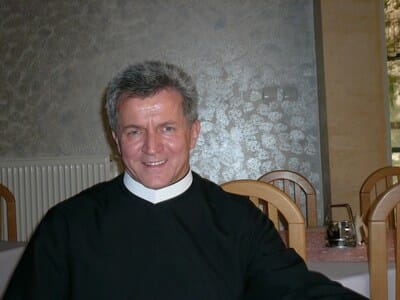
May 31, 2015 | Focolare Worldwide, Senza categoria
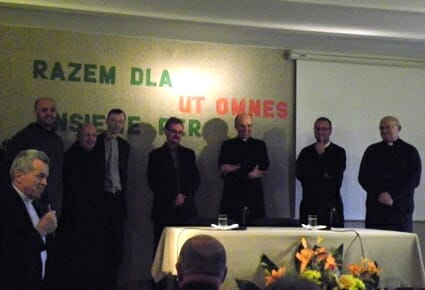 While visiting Poland, Maria Voce and Jesús Moran, President and Co-President of the Focolare Movement, respectively, held a meeting on 26 May in the Mariapolis Fiore (Poland) with a group of priests and religious who were bound in various ways to the Focolare. Fr. Zdzislaw Klafka, a Redemptorist, recounted his encounter with the spirituality of unity and the positive effects in living his specific vocation in a more radical manner. «I feel so grateful to Chiara Lubich for having been God’s docile tool in bringing about in the Church, a spirituality that has helped me face the difficulties in life: When I was nominated the Superior of my congregation, I found a challenge before me. I was in Rome and before returning to Poland, I asked her to suggest a phrase of the Gospel that could enlighten my path. She answered: “No one has greater love than he who gives up his life for his friends.” I was then 29 years old and that phrase became the compass that showed me the way. In living the spirituality of unity I started to look up to my founder, St. Alphonse, in a new way. This was how I rediscovered not only my roots but the evangelical force that lies within every other charism of the Church. Someone asked me whether my adhering to the spirituality of the Focolare was not time stolen from my duties as a Redemptorist. The fact is, and I have experienced it repeatedly, that when I return from my meetings with the religious of other orders, I feel the desire to live my own choice of God even more radically.»
While visiting Poland, Maria Voce and Jesús Moran, President and Co-President of the Focolare Movement, respectively, held a meeting on 26 May in the Mariapolis Fiore (Poland) with a group of priests and religious who were bound in various ways to the Focolare. Fr. Zdzislaw Klafka, a Redemptorist, recounted his encounter with the spirituality of unity and the positive effects in living his specific vocation in a more radical manner. «I feel so grateful to Chiara Lubich for having been God’s docile tool in bringing about in the Church, a spirituality that has helped me face the difficulties in life: When I was nominated the Superior of my congregation, I found a challenge before me. I was in Rome and before returning to Poland, I asked her to suggest a phrase of the Gospel that could enlighten my path. She answered: “No one has greater love than he who gives up his life for his friends.” I was then 29 years old and that phrase became the compass that showed me the way. In living the spirituality of unity I started to look up to my founder, St. Alphonse, in a new way. This was how I rediscovered not only my roots but the evangelical force that lies within every other charism of the Church. Someone asked me whether my adhering to the spirituality of the Focolare was not time stolen from my duties as a Redemptorist. The fact is, and I have experienced it repeatedly, that when I return from my meetings with the religious of other orders, I feel the desire to live my own choice of God even more radically.»

Fr. Zdzislaw Klafka
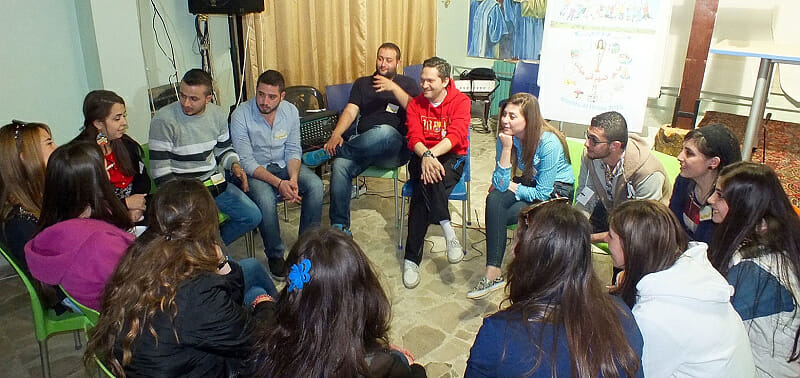
May 30, 2015 | Focolare Worldwide
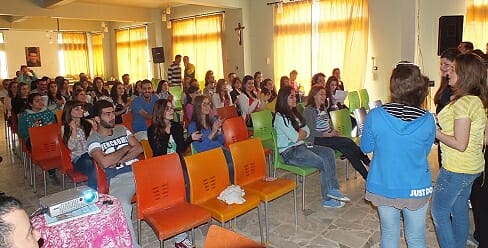 They arrived from: Damascus, Aleppo, Homs, Banias, Kfarbo and Tartous. Who would have ever imagined spending a week-end with the youth from all parts of Syria. Is this pure madness? The organizers asked themselves. Maybe so, but it became a reality. The number kept growing day after day, until it reached a total of 67. «This is how our adventure began,» they recounted. «We chose a safe place which all could reach, even if the trip took 10 hours. The idea was to spend three days together to live, share, pray, cry, and play, immersed in nature but with mutual love among us.» «What matters most in my life?» was the title of the week-end, a question that echoed even more in an uncertain situation like that of the young Syrians. They divided into four groups that focused on different themes: “A special bond with the Father,” “With Jesus every day,” “the Love that makes us free,” and “Love for Mary,” which they deepened with passages of the Holy Scriptures, the Popes and saints, accompanied by true stories of other youth who had preceded them along the path towards sanctity. When I arrived for the week-end I was tired of the war – confided Fatima – and I felt that life was stagnant, but then once again I experienced God’s presence in my life and his Love for us through the love of the others. Now when I undergo difficult moments, I just need to think that someone is praying for me and is trying to live in the same way, and this gives me a great inner peace. I have understood that the most important thing is to live life … loving Jesus in every neighbour.»
They arrived from: Damascus, Aleppo, Homs, Banias, Kfarbo and Tartous. Who would have ever imagined spending a week-end with the youth from all parts of Syria. Is this pure madness? The organizers asked themselves. Maybe so, but it became a reality. The number kept growing day after day, until it reached a total of 67. «This is how our adventure began,» they recounted. «We chose a safe place which all could reach, even if the trip took 10 hours. The idea was to spend three days together to live, share, pray, cry, and play, immersed in nature but with mutual love among us.» «What matters most in my life?» was the title of the week-end, a question that echoed even more in an uncertain situation like that of the young Syrians. They divided into four groups that focused on different themes: “A special bond with the Father,” “With Jesus every day,” “the Love that makes us free,” and “Love for Mary,” which they deepened with passages of the Holy Scriptures, the Popes and saints, accompanied by true stories of other youth who had preceded them along the path towards sanctity. When I arrived for the week-end I was tired of the war – confided Fatima – and I felt that life was stagnant, but then once again I experienced God’s presence in my life and his Love for us through the love of the others. Now when I undergo difficult moments, I just need to think that someone is praying for me and is trying to live in the same way, and this gives me a great inner peace. I have understood that the most important thing is to live life … loving Jesus in every neighbour.»  On the first day they delve d deeper into one of the main tenets of the spirituality of unity, «God who is Love.» Tracing the story of the beginning of the Focolare in Trent during the Second World War, in the destruction of all, they traced also the reality of Syria today. «Everything passes, only God remains,» someone said, and so: «What matters most in my life?». One of them said: «Living Christianity in a radical way.» On the second day, through a discourse of Chiara Lubich to the youth in the 1970s, «Jesus the Master,» their choice of God emerged. «We even sang, danced and played in the evenings, and it made us all feel like a true family,» Murad and Lina wrote. Upon leaving, some said: «I thank Jesus for all the moments of joy and pain.» Haashim said «I experienced God’s caress once again – I feel the responsibility of bringing this grace to all around us.» Unforgettable days. «During the week-end – Samir wrote – «we made our fill of peace and serenity that have given us the strength to return to living in this dramatic situation.» And Nahda concluded – «Despite the absurdity of the war, I no longer feel alone.»
On the first day they delve d deeper into one of the main tenets of the spirituality of unity, «God who is Love.» Tracing the story of the beginning of the Focolare in Trent during the Second World War, in the destruction of all, they traced also the reality of Syria today. «Everything passes, only God remains,» someone said, and so: «What matters most in my life?». One of them said: «Living Christianity in a radical way.» On the second day, through a discourse of Chiara Lubich to the youth in the 1970s, «Jesus the Master,» their choice of God emerged. «We even sang, danced and played in the evenings, and it made us all feel like a true family,» Murad and Lina wrote. Upon leaving, some said: «I thank Jesus for all the moments of joy and pain.» Haashim said «I experienced God’s caress once again – I feel the responsibility of bringing this grace to all around us.» Unforgettable days. «During the week-end – Samir wrote – «we made our fill of peace and serenity that have given us the strength to return to living in this dramatic situation.» And Nahda concluded – «Despite the absurdity of the war, I no longer feel alone.»
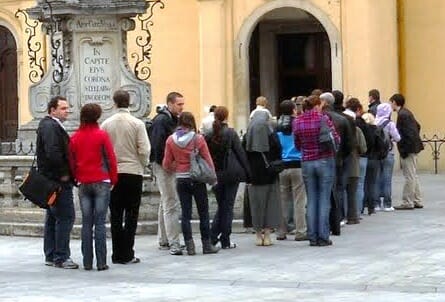
May 28, 2015 | Focolare Worldwide
 “My current parish is found in one of the neighbourhoods of Bratislava, the capital of Slovakia,” says Fr Ludovit. “The city has about 4,300 inhabitants, of which 3,500 are Christians, and the numbers continue to grow. When I arrived here in July 2009, I knew my first task was to love people with the love of Jesus. Now I can say that I’m happy because a beautiful community has sprung up between people of different ages and social status, from different Slovakian cities, who have discovered a new relationship with God, not just through the Bible and prayer, but also through the community and various parish activities. They have found here the joy in the faith which is worth living for. When I first arrived, there were no young people: the government had banned the construction of new buildings, so many young couples had moved elsewhere. Furthermore, there was no program of formation in the faith for the few teens there were. I met three young people who had the desire to help me, but they were immersed in their own work and studies. At that time I invited the teens and the young people who had recently been confirmed to a barbecue. They came as a sign of respect, but they never returned. “We’ve already received Confirmation, so there’s no need to go to Mass anymore,” they told me. In this situation, I entrusted everything to Jesus. Since September 2009, I have been teaching Catechism in all of the elementary and middle school classes (about 150 children and teens). At the same time, I started a Sunday Mass for families. I tried to take advantage of every occasion to build relationships: greeting people on the street, visiting others in their home, exchanging a few words at the shops, in the office, or at school. And again: invitations to a barbecue and to play sports on the parish grounds. Little by little people began to participate. Gradually a community was forming; there were children who didn’t want to miss out, young mothers who discovered a common bond because their children were the same age, dads who invited one another to help with various odd jobs in the church or in the parish house, but also to play tennis or have a beer together. Even the mayor and some members of parliament began to participate. One day, Jesus also sent me Blanka, who is now the choir director and the leader of many events.” “Many say that ours is ‘a live parish’,” affirms Blanka. “In spite of our individual differences, we constantly search for what unites us, and we always return to the fount of unity, of love, and of forgiveness, which is Jesus. We parents try to create the practical conditions so that many activities can be carried out. Often they are to the detriment of our time, our rest or housework, but it is truly wonderful to see that everyone supports not only their own children, but all of “our” children. This is the case with Michael, an autistic boy who is now adolescent. I am very glad to see that the other teens are open towards him inviting him to join them and considering him their equal. And Michael loves them a lot and feels that they all are part of his big family.” “I am an allergist/immunologist and I work in a non-government capacity at the Pediatric University Hospital of Bratislava,” continues Dagmar. “The Pastoral Center and the parish Nursery School which were constructed have become ‘poles’ of different activities for our children, teens, and young people, of which the number is constantly growing. One day, in May 2012, Fr Ludo asked me if I were available to participate as a medical doctor at a summer camp for teens in our parish. I immediately said no. But then, I remembered the faces of the teens that I knew. In the end I said yes, and now it is already my 4th year! I have become more sensitive to the suffering of the children and to their fears for their health when they find themselves without their parents. This experience has helped me to understand the deeper significance of service to others.” “A very important meeting occurred last year in Benevento (Italy), organized by the Parish Movement,” concludes Fr Ludovit. “Our young people came away with ‘an encouragement, a spiritual strength, a closer relationship with God,’ they said, ‘and above all, the desire to live “committed to love,” because whatever we do, if it does not have love, loses its value and significance.’ For me it was a confirmation that the community had not only been born and consolidated, but that it rests on the faith of the young people. The future, therefore, is secured.”
“My current parish is found in one of the neighbourhoods of Bratislava, the capital of Slovakia,” says Fr Ludovit. “The city has about 4,300 inhabitants, of which 3,500 are Christians, and the numbers continue to grow. When I arrived here in July 2009, I knew my first task was to love people with the love of Jesus. Now I can say that I’m happy because a beautiful community has sprung up between people of different ages and social status, from different Slovakian cities, who have discovered a new relationship with God, not just through the Bible and prayer, but also through the community and various parish activities. They have found here the joy in the faith which is worth living for. When I first arrived, there were no young people: the government had banned the construction of new buildings, so many young couples had moved elsewhere. Furthermore, there was no program of formation in the faith for the few teens there were. I met three young people who had the desire to help me, but they were immersed in their own work and studies. At that time I invited the teens and the young people who had recently been confirmed to a barbecue. They came as a sign of respect, but they never returned. “We’ve already received Confirmation, so there’s no need to go to Mass anymore,” they told me. In this situation, I entrusted everything to Jesus. Since September 2009, I have been teaching Catechism in all of the elementary and middle school classes (about 150 children and teens). At the same time, I started a Sunday Mass for families. I tried to take advantage of every occasion to build relationships: greeting people on the street, visiting others in their home, exchanging a few words at the shops, in the office, or at school. And again: invitations to a barbecue and to play sports on the parish grounds. Little by little people began to participate. Gradually a community was forming; there were children who didn’t want to miss out, young mothers who discovered a common bond because their children were the same age, dads who invited one another to help with various odd jobs in the church or in the parish house, but also to play tennis or have a beer together. Even the mayor and some members of parliament began to participate. One day, Jesus also sent me Blanka, who is now the choir director and the leader of many events.” “Many say that ours is ‘a live parish’,” affirms Blanka. “In spite of our individual differences, we constantly search for what unites us, and we always return to the fount of unity, of love, and of forgiveness, which is Jesus. We parents try to create the practical conditions so that many activities can be carried out. Often they are to the detriment of our time, our rest or housework, but it is truly wonderful to see that everyone supports not only their own children, but all of “our” children. This is the case with Michael, an autistic boy who is now adolescent. I am very glad to see that the other teens are open towards him inviting him to join them and considering him their equal. And Michael loves them a lot and feels that they all are part of his big family.” “I am an allergist/immunologist and I work in a non-government capacity at the Pediatric University Hospital of Bratislava,” continues Dagmar. “The Pastoral Center and the parish Nursery School which were constructed have become ‘poles’ of different activities for our children, teens, and young people, of which the number is constantly growing. One day, in May 2012, Fr Ludo asked me if I were available to participate as a medical doctor at a summer camp for teens in our parish. I immediately said no. But then, I remembered the faces of the teens that I knew. In the end I said yes, and now it is already my 4th year! I have become more sensitive to the suffering of the children and to their fears for their health when they find themselves without their parents. This experience has helped me to understand the deeper significance of service to others.” “A very important meeting occurred last year in Benevento (Italy), organized by the Parish Movement,” concludes Fr Ludovit. “Our young people came away with ‘an encouragement, a spiritual strength, a closer relationship with God,’ they said, ‘and above all, the desire to live “committed to love,” because whatever we do, if it does not have love, loses its value and significance.’ For me it was a confirmation that the community had not only been born and consolidated, but that it rests on the faith of the young people. The future, therefore, is secured.”
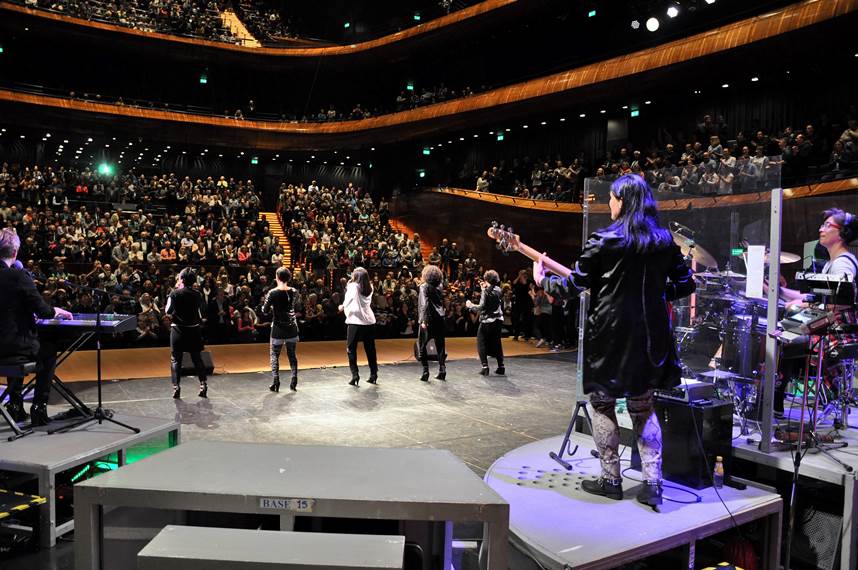
May 27, 2015 | Focolare Worldwide
 Also called the City of Dialogue, Katowice – in the south of Poland, is a mining city par excellence – because it is one of the Polish municipalities that has the most numerous interreligious representatives. It boasts a Centre for Islamic Culture dedicated to prayer and education, and the Doha Centre for Dialogue and Culture dedicated primarily to dialogue, which will celebrate on 29 May, the «3rd Day of Christianity among Muslims» focused on the theme “Jesus – brother of each one of us,” as seen from the Christian and Muslim perspective. Also Maria Voce and Jesús Morán, President and Co-President of the Focolare, respectively, will participate, and who also will be travelling to Belarus and Poland to visit the communities of the Movement. In retrospect, there has been for some time now in Katowice, a network of fraternal relationships and cooperation among Christians of various Churches, Jews, Muslims, the academic world and civil institutions. On the occasion of the 150th anniversary of the city’s founding, the international Gen Verde band was invited to bring a message of fraternity with its music. The band has for some years now, brought to the public an educational artistic project implemented through workshops that feature onstage the youth who have attended their workshops of various disciplines: dance, singing, theatre, percussions on various instruments and even “body percussion.” About 140 boys and girls attended the workshop in Poland and contributed with their talents to the show staged with the band. But what really stirred up interest is the fact that the project also saw the participation of young Muslims, Jews and Christians of various denominations. The posters announcing the event drew the attention of so many that only six hours after the opening of the box office, the 1,450 tickets were already sold out. A Muslim girl who participated in the workshop and the show, thanked the group since she had never “felt so warmly welcomed.” This fact impressed all especially against a background of the recent terrorist acts. Upon returning from Poland, Gen Verde wrote: «We worked with 140 marvelous young people, who were the expression of an open, profound and sensitive people, forged by a faith that has been harshly tested by great suffering. They said that they experienced unity and trust that transformed them and made them fly.»
Also called the City of Dialogue, Katowice – in the south of Poland, is a mining city par excellence – because it is one of the Polish municipalities that has the most numerous interreligious representatives. It boasts a Centre for Islamic Culture dedicated to prayer and education, and the Doha Centre for Dialogue and Culture dedicated primarily to dialogue, which will celebrate on 29 May, the «3rd Day of Christianity among Muslims» focused on the theme “Jesus – brother of each one of us,” as seen from the Christian and Muslim perspective. Also Maria Voce and Jesús Morán, President and Co-President of the Focolare, respectively, will participate, and who also will be travelling to Belarus and Poland to visit the communities of the Movement. In retrospect, there has been for some time now in Katowice, a network of fraternal relationships and cooperation among Christians of various Churches, Jews, Muslims, the academic world and civil institutions. On the occasion of the 150th anniversary of the city’s founding, the international Gen Verde band was invited to bring a message of fraternity with its music. The band has for some years now, brought to the public an educational artistic project implemented through workshops that feature onstage the youth who have attended their workshops of various disciplines: dance, singing, theatre, percussions on various instruments and even “body percussion.” About 140 boys and girls attended the workshop in Poland and contributed with their talents to the show staged with the band. But what really stirred up interest is the fact that the project also saw the participation of young Muslims, Jews and Christians of various denominations. The posters announcing the event drew the attention of so many that only six hours after the opening of the box office, the 1,450 tickets were already sold out. A Muslim girl who participated in the workshop and the show, thanked the group since she had never “felt so warmly welcomed.” This fact impressed all especially against a background of the recent terrorist acts. Upon returning from Poland, Gen Verde wrote: «We worked with 140 marvelous young people, who were the expression of an open, profound and sensitive people, forged by a faith that has been harshly tested by great suffering. They said that they experienced unity and trust that transformed them and made them fly.»  «The show was held in the NOSPR, the new auditorium built over the old mines and for the first time in history, this temple of symphonic music, opened out to our rock music. Every corner of the auditorium was filled to the brim with the public that vibrated with us right from the start, in a crescendo. On hearing the first Polish words we sang (the refrain of two songs) they burst into a moving applause, and at the end of the concert, immense joy pervaded.» A little show within the show unfolded when the mayor, a representative of the Catholic community, a representative of the Jewish community and an Imam, appeared on stage in a spiritual and ideal embrace to testify to a true fraternity that was nurtured through the years. A priest remarked: “We are testimonials to something short of a miracle. If we have these young people among us as we saw today, the world will not die. With this method of dialogue you can save the world. ” The Rabbi then added; “We do not fear the future because… we are together.”
«The show was held in the NOSPR, the new auditorium built over the old mines and for the first time in history, this temple of symphonic music, opened out to our rock music. Every corner of the auditorium was filled to the brim with the public that vibrated with us right from the start, in a crescendo. On hearing the first Polish words we sang (the refrain of two songs) they burst into a moving applause, and at the end of the concert, immense joy pervaded.» A little show within the show unfolded when the mayor, a representative of the Catholic community, a representative of the Jewish community and an Imam, appeared on stage in a spiritual and ideal embrace to testify to a true fraternity that was nurtured through the years. A priest remarked: “We are testimonials to something short of a miracle. If we have these young people among us as we saw today, the world will not die. With this method of dialogue you can save the world. ” The Rabbi then added; “We do not fear the future because… we are together.”

 “The Economy of Communion (EoC) has returned to Africa. We’re here from around world, drawn by both the blessings and the wounds of this great continent, to take a look at the world economy from an African perspective; also to be taught by these peoples, by their great calling to life, social relationships and encounter. I have always been struck by Africa’s ability to create, and by its life. There is a lot of dancing in Africa, a lot of feasting and celebration. One thing that I find stupendous in Africa is that you even see elderly women dancing. Nowadays, in Europe and in the Northern hemisphere it is less common to see elderly men and women freely celebrating and dancing over the joy of being together. We also came to Africa to learn how to dance, men, women and children. Africa certainly has a vocation to generate life in all of its dimensions. The sense of brotherhood with the earth and with all of nature is a great value of African culture. This is one of the many gifts that Africa offers to the entire Economy of Communion worldwide, and many future generations should make this discovery. What messages can reach the Africa of today from the EoC? We will take the time to tell our stories, both great and small, and from there we will set out into a new land. The first contribution that the EoC would like to take to Africa is appreciation and esteem for what Africa already is and not only for what it might become. The people’s first strength is their dreams, especially their collective dreams and those of the poor. Generating is very connected to an economic term that is important for Africa and for everyone: innovation. A first message that we receive from the logic of this new budding is subsidiatiry: our hands and our technology can only subsidize, that is, help the bud to bloom; they cannot invent it. The economic and social innovations of Africa will grow primarily from its own soil, from its land and not from the outside. The gift of the EoC is that of having eyes that can see buds where others see only deserts. There are many young people here in Africa who have already begun the walk, often together: and it is from these buds that we should learn to see the forest. The essential energy of any undertaking is the hunger for life, and for the future of young people and the poor, who are very abundant here in Africa. In order for the poor and excluded to become an engine of change of a country, the role of political and economic institutions is essential. New financial institutions are being born from the EoC. But banks and all the other institutions are only able to assist economic innovations, not create or invent them. Without people with creativity, talent, competence and passion, you will never give rise to the experience of a new economy. It is necessary that each individual activates his or her own innovative skills and, if possible, join it to that of others who have the same wish to do and create. Our dream is to create one of these institutions right here at Mariapolis Piero. It will be a centre that can be a place for trust, for accompanying and serving new EoC ideas that will be born especially from young people.”
“The Economy of Communion (EoC) has returned to Africa. We’re here from around world, drawn by both the blessings and the wounds of this great continent, to take a look at the world economy from an African perspective; also to be taught by these peoples, by their great calling to life, social relationships and encounter. I have always been struck by Africa’s ability to create, and by its life. There is a lot of dancing in Africa, a lot of feasting and celebration. One thing that I find stupendous in Africa is that you even see elderly women dancing. Nowadays, in Europe and in the Northern hemisphere it is less common to see elderly men and women freely celebrating and dancing over the joy of being together. We also came to Africa to learn how to dance, men, women and children. Africa certainly has a vocation to generate life in all of its dimensions. The sense of brotherhood with the earth and with all of nature is a great value of African culture. This is one of the many gifts that Africa offers to the entire Economy of Communion worldwide, and many future generations should make this discovery. What messages can reach the Africa of today from the EoC? We will take the time to tell our stories, both great and small, and from there we will set out into a new land. The first contribution that the EoC would like to take to Africa is appreciation and esteem for what Africa already is and not only for what it might become. The people’s first strength is their dreams, especially their collective dreams and those of the poor. Generating is very connected to an economic term that is important for Africa and for everyone: innovation. A first message that we receive from the logic of this new budding is subsidiatiry: our hands and our technology can only subsidize, that is, help the bud to bloom; they cannot invent it. The economic and social innovations of Africa will grow primarily from its own soil, from its land and not from the outside. The gift of the EoC is that of having eyes that can see buds where others see only deserts. There are many young people here in Africa who have already begun the walk, often together: and it is from these buds that we should learn to see the forest. The essential energy of any undertaking is the hunger for life, and for the future of young people and the poor, who are very abundant here in Africa. In order for the poor and excluded to become an engine of change of a country, the role of political and economic institutions is essential. New financial institutions are being born from the EoC. But banks and all the other institutions are only able to assist economic innovations, not create or invent them. Without people with creativity, talent, competence and passion, you will never give rise to the experience of a new economy. It is necessary that each individual activates his or her own innovative skills and, if possible, join it to that of others who have the same wish to do and create. Our dream is to create one of these institutions right here at Mariapolis Piero. It will be a centre that can be a place for trust, for accompanying and serving new EoC ideas that will be born especially from young people.”




 While visiting Poland,
While visiting Poland, 



